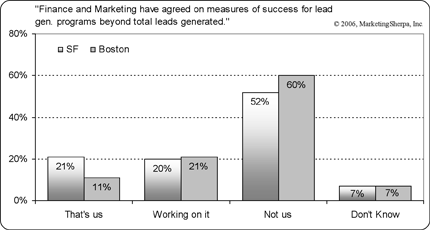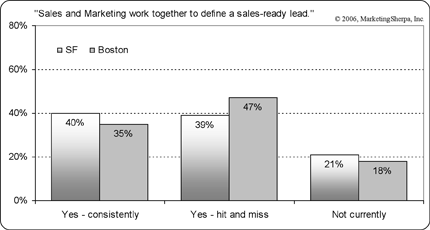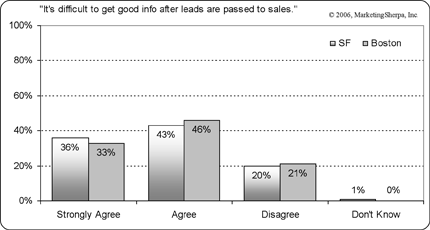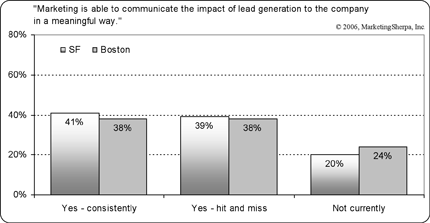How bad is the disconnect between the marketing department and the decision-makers who affect its budget?
According to MarketingSherpa stats, if you run marketing for a business technology firm, your salary, your staff and your entire marketing budget represent -- on average -- only 3% of total company annual revenues.
If you want to get more budget and more power over your budget (not to mention keep your job for longer than the average 24-month period), you need more power within your organization than perhaps 3% on the surface might appear to entitle you to. Most critically, both the CFO and the heads of sales have to be sold on marketing's value to the organization.
Scott Santucci, Founder BluePrint Marketing, who consults with marketing departments on measurement and analytics, says, unfortunately, many B-to-B marketers are not ready or able to prove marketing's value effectively.
Inspired by Santucci's concern, MarketingSherpa's research team surveyed the attendees of our annual B-to-B Demand Generation Summits held in Boston and San Francisco this October and November, respectively. We received answers from 124 Boston and 103 San Francisco attendees -- 227 in total.
Our goal: to gain real-life data on B-to-B marketing office politics and possible fixes. Here are the results and some insights:
1.01 Chart: Are CFOs Gunning for the Lead Generation Budget?
Source: MarketingSherpa, Survey of Demand Generation Summit Attendees, October-November 2006
As you can see above, the good news is that most B-to-B lead generation marketing executives surveyed don’t see their CFOs as adversaries. But, for one in three respondents, a perception exists that the finance department is on the lookout for ways in which to cut the budget for lead generation programs significantly. Are these perceptions based in reality? See the next chart …
1.02 Chart: Do CFOs Understand the Contributions of Lead Generation?
Source: MarketingSherpa, Survey of Demand Generation Summit Attendees, October-November 2006
The above data is very worrying. CFOs generally make budgeting decisions and recommendations based on facts and figures. Relationship and influence building with CFOs depend on presenting them with useful data that enables them to understand the value of your department. As you can see, only 17% of B-to-B marketers we queried were sure their CFOs understood the value of lead generation programs.
The other 83% -- most of whom had blithely answered our first question about the CFO and their budget with a "no problem" -- may be in for a nasty shock come final budget time.
As Santucci notes, unless your CFO understands the calculations behind lead quality, lead generation and the bottom line, he or she won't stand up for you. This is what leads to marketers being forced to lower their cost per lead … without reference to quality. Or, to lower brand marketing expenditures … without reference to the impact lead generation responses will feel later.
1.03 Chart: Do Finance & Marketing Agree on How to Evaluate Lead Gen Campaign Success?
Source: MarketingSherpa, Survey of Demand Generation Summit Attendees, October-November 2006
Marketing and Finance speak different languages. Most metrics of lead generation, such as open or conversion rates, don’t mean much to someone focused on the bottom line.
If you don't agree on meaningful success metrics, your CFO may suggest budget cuts that are detrimental to marketing performance. What's an effective success metric? Ultimately, it's a lead that turns into profitable business. That may not be the cheapest lead. And, it may not be a lead that comes in via the most responsive marketing method, such as a runaway viral campaign.
If low costs and high response rates are not be related to success, what is? Only you, together with a committee including Finance and Sales, know what success looks like for your organization.
1.04 Chart: Does Marketing ‘Close the Loop’ on Leads Generated?
Source: MarketingSherpa, Survey of Demand Generation Summit Attendees, October-November 2006
No matter what definition of success you agree on with the CFO and sales department, it will almost certainly require measuring marketing's impact all the way to the bottom line -- aka "closed loop metrics."
Unfortunately, many marketers don't have the resources -- time, staffing and technology -- to be able to close that loop. So, your first step in creating measurements that a CFO will agree to buy into is getting the budget to enable measuring itself.
Luckily, in the short term, you can use work-arounds to create metrics. Some marketers admit they use an intern or a part-time admin staffer to gather marketing touch data discretely for each closed sale per quarter. You can do this for one marketplace segment to start to prove to the CFO that measurement is possible and worth the investment.
Next, the office politics often move onto working with the CTO to enable measurement technology.
1.05 Chart: Do Sales Teams Value Marketing Leads?
Source: MarketingSherpa, Survey of Demand Generation Summit Attendees, October-November 2006
Finance is not the only part of the organization that sometimes fail to see the entire value of marketing’s lead generation programs. 60% of survey respondents think that Sales has a low opinion of the leads generated by the marketing department. What's at the root of this problem? See the next chart …
1.06 Chart: How Well Are Sales and Marketing Working Together to Define Leads?
Source: MarketingSherpa, Survey of Demand Generation Summit Attendees, October-November 2006
In the world of office politics, it's always best to get potential adversaries or naysayers to buy in from the very start of something new. If they are not involved and heard at the beginning, it's unlikely they'll adore the results at the end.
The good news is that roughly 80% of surveyed marketers understand this and are working together with the sales department -- at least sometimes -- to define what a good lead is before the marketing campaign begins. If you're not in that camp, chances are that your relations with the sales department are strained.
1.07 Chart: How Well Are Marketers Tracking Leads After Passing Them to Sales?
Source: MarketingSherpa, Survey of Demand Generation Summit Attendees, October-November 2006
This chart reveals that the dreaded 'black hole' is still very much present in most organizations. Marketing sends what they consider to be good leads over to the sales team. Then, they hope for some feedback. Roughly 80% of the time, that feedback sounds much like silence.
If you can't get the sales department to tell you how your leads were, then you can't improve your generation tactics to target better types of leads or your creative nurturing campaigns to warm the leads that weren't quite ready for primetime. And, last but not least, you can't defend your budget for next year.
The problem is, of course, the sales department is extremely busy. They don't have the time or patience to do the admin filing notes to Marketing to let them know how each lead turned out. Your job in marketing is to find creative ways to pry the information you need from Sales without the perception that you are wasting their time when they could be closing deals. The CFO and head of sales can help you with this politically as well … if you convince them it's worth the work.
1.08 Chart: Does the Rest of the Company Understand the Impact of Lead Generation?
Source: MarketingSherpa, Survey of Demand Generation Summit Attendees, October-November 2006
It's easy for the sales team to look like heroes to the rest of the company -- they are landing accounts! A CFO can also look like a hero -- he or she is managing costs so there's a profit. But, as evidenced by the above chart, all the other departments don't always cheer when they see Marketing walk down the hall … or enter the committee room. Too often, you're just a suit about whose value people are not sure.
It's time for the marketing department to fight back and take deserved pride in your work. How? By using success measurements that other departments can easily agree make a huge difference. They may not know what an open rate or opt-in is. But everyone knows what a new customer looks like.
1.09 Chart: Sales Cycle Comparison
Source: MarketingSherpa, Survey of Demand Generation Summit Attendees, October-November 2006
We include this chart so you can see how closely the marketers we surveyed in Boston, San Francisco and in our annual B-to-B reader survey match your own organization. Since MarketingSherpa began tracking this data across all our B-to-B readers in 2004, we have seen significant lengthening of the sales cycle, which now averages more than six months.
The elongated cycle has complicated lead generation, because it is increasingly difficult for some organizations to identify when a lead is ‘sales-ready.’ Lead generation has given way to lead nurturing as prospects move through multiple stages of interest and engagement.
This evolution makes the role of marketing more complicated and intensifies the need to communicate effectively with the sales and finance teams. Without agreed-upon definitions or feedback from sales, it’s impossible to measure tactical effectiveness or the ultimate number of closed deals that benefited from lead generation programs accurately. Lacking these hard proofs of marketing’s contributions, the finance department will continue to question further investment in lead generation programs.
Result? Office politics and the art of defending your marketing budget are getting progressively tougher year after year. The sooner you can start or improve measurement programs to help, the better.
Useful links related to this article:BluePrint Marketing:
http://www.blueprintmarketing.com
MarketingSherpa's annual Business Technology Marketing Benchmark Guide:
http://www.sherpastore.com/b2bbenchmark08.html


















